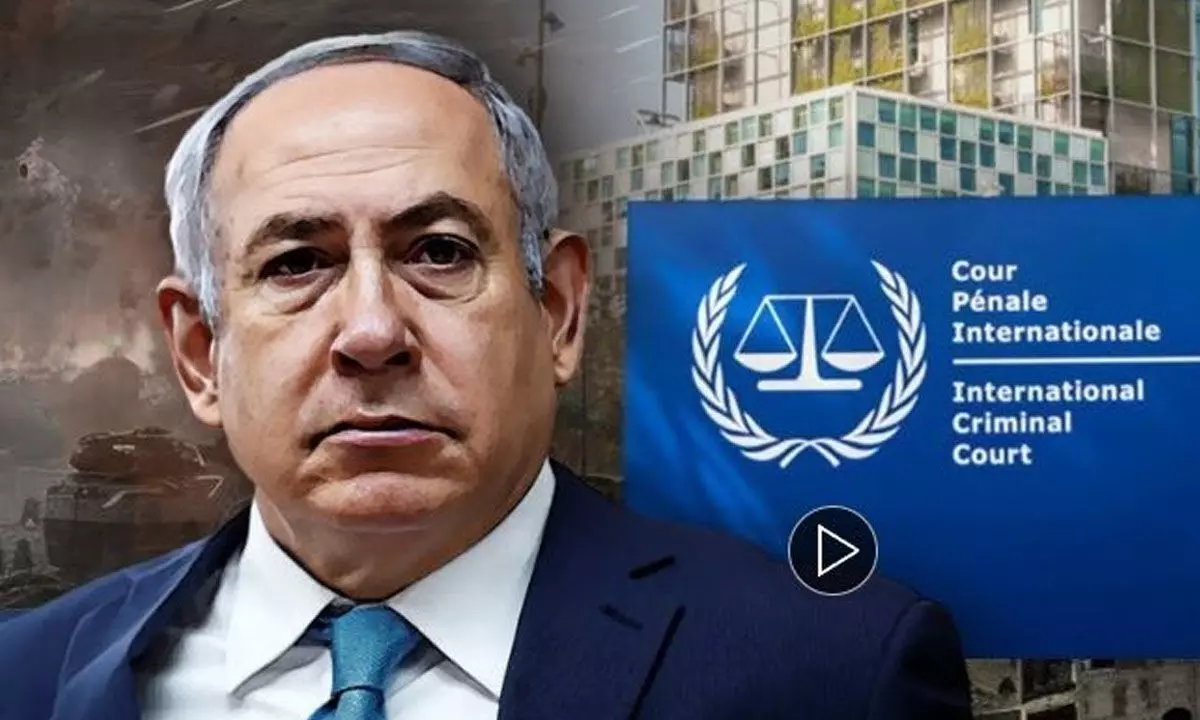Who’ll win? Int’l Law or Netanyahu?

The ICC, similarly, doesn’t have an army at its disposal to enforce its rulings. But international law has a certain institutional power that can accumulate over time. Which leaves open the question: How long can Netanyahu hold out politically against criticisms from within Israel and outside its borders?
Benjamin Netanyahu’s face may soon be on Wanted posters around the world.
In Israel, the prime minister has been charged with various counts of corruption. But now that the International Criminal Court (ICC) has requested a warrant for Netanyahu’s arrest on war crimes, he may become a global outlaw as well.
It’s not a done deal. The chief prosecutor has requested the warrants. Next, it’s up to the ICC judges to determine whether the evidence is sufficient to issue those warrants.
Netanyahu is not alone. The latest ICC application for warrants applies to Israeli Defense Minister Yoav Gallant as well as three leaders of Hamas.
Has international law been weakened sufficiently by the successive onslaughts of Vladimir Putin, Viktor Orbán, Narendra Modi, Donald Trump, and others such that Netanyahu can avoid the fate of Milošević?
Meanwhile, the Israeli army undercut Netanyahu’s rebuttal and confirmed the ICC’s initial determination when, as part of its continuing assault on the southern city of Rafah, it bombed a Palestinian tent encampment in Gaza this week, killing dozens of women and children. An apology from Netanyahu about the civilian losses has done little to assuage international public opinion, particularly given all the previous Israeli military assaults that have led to over 36,000 Palestinian deaths so far in this war.
Stalin once reportedly said of the Pope and his criticisms of Soviet treatment of Catholics, “How many divisions does he have?” The ICC, similarly, doesn’t have an army at its disposal to enforce its rulings. But international law has a certain institutional power that can accumulate over time. Which leaves open the question: How long can Netanyahu hold out politically against criticisms from within Israel and outside its borders?
Bibi Besieged
Nearly 3 out of 4 Israelis want Netanyahu to resign and new elections to be held. Even though most Israelis support the war in Gaza, they are furious at their prime minister for the security lapses that allowed the October 7 attacks to happen and for not negotiating the return of the remaining hostages taken on that day. So far, Netanyahu has resisted calls from even those within his own cabinet to step down and hold new elections. That’s no surprise, given that his Likud Party polls well behind the opposition alliance.Bringing Netanyahu to justice would be a repudiation of his “rule of the jungle” ethos. Perhaps, the ICC announcement is a lifeline for Bibi. Perhaps the Israeli public will rally around Netanyahu – he may be a jerk, but he’s our jerk – and seek to protect him from outside prosecution. Those angling to replace Netanyahu – Benny Gantz, Yair Lapid – have indeed rushed to defend Bibi.Outside Israel, Netanyahu can count on a dwindling number of allies. Although the Biden administration denounced the ICC’s statement, Americans are also increasingly fed up with Netanyahu’s actions.
The Case of Milošević
Serbian strongman Slobodan Milošević was first indicted on charges of war crimes in Kosovo by the Hague Tribunal in March 1999. Those charges were later expanded to include his actions during the wars he promoted in Bosnia and Croatia. It would take more than two years before Milošević was taken into custody. First, he had to lose an election. Then the United States had to pressure the newly elected government not only to arrest the former leader but deliver him to The Hague. In 2002, Milošević went on trial, which lasted for four years. He died in 2006 before a final verdict was reached.
Although Milošević was never sentenced, the trials at The Hague did bring a measure of justice to those who suffered in the wars in former Yugoslavia. The tribunal indicted 161 individuals and sentenced 90 of them. Although most of those indicted were Serbian, there were also cases against those who committed crimes against Serbs.
The process of dealing with the Yugoslav wars was necessarily flawed, but it also gave a shot in the arm to international law and the attempts to prosecute human rights violations at the global level. The tribunal sent a signal to leaders everywhere that they cannot equate sovereignty with impunity.
Today, however, we live in an era of sovereignistas. These leaders insist that they can do whatever they want within their own national borders, international law be damned. Benjamin Netanyahu certainly claims this privilege. Has international law been weakened sufficiently by the successive onslaughts of Vladimir Putin, Viktor Orbán, Narendra Modi, Donald Trump, and others such that Netanyahu can avoid the fate of Milošević?
Netanyahu doesn’t believe in the rule of law. After all, he isn’t trying to arrest the leaders of Hamas, he is trying to kill them. Bringing Netanyahu to justice would be a repudiation of his “rule of the jungle” ethos. It would also signal to the sovereignistas that borders are no protection against prosecution for war crimes. His whole life, Netanyahu has fought the law. Let’s hope that, in the end, the law will win.
(John Feffer is the author of the dystopian novel “Splinterlands” (2016) and the director of Foreign Policy In Focus at the Institute for Policy Studies; https://www.commondreams.org/)














